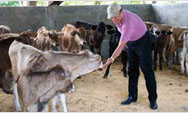To develop long lasting results in Peru’s health sector, USAID has designed strategies to strengthen the institutions that train and recertify health professionals, as well as those that accredit health care facilities. In partnership with the Peruvian Association of Nursing Schools, the Peruvian Association of Medicine Schools, the Peruvian Association of Midwifery Schools, and the Committee for Accreditation of Schools of Medicine, USAID is providing assistance to develop professional consensus regarding basic educational standards, as well as procedures for internal and peer evaluation.
Nationwide, the twenty-eight schools of medicine, forty-seven nursing schools, and twenty-four midwifery schools have participated in this process. The schools of medicine have strengthened their accreditation process by improving competencies of peer reviewers. The schools of midwifery have developed a consensus regarding competencies for midwifery training. As a whole, more than 5,000 health professionals have participated in various training programs to develop standards, evaluation skills, and peer review processes.
The movement for high quality health education has reached the students of nursing and midwifery schools. In the National Congress of Students, among the main topics of discussion is the accreditation status of their respective schools. The movement has also involved other civil society leaders beyond the health sector. The “Group for Initiatives for Quality Superior Education” (GICES) was formed in 2003 and is made up of a wide range of professionals. GICES has proposed legislation for structuring the National Institute for the Accreditation of Superior Education in Peru, and this initiative is now pending discussion and approval in the Peruvian Congress.
|


